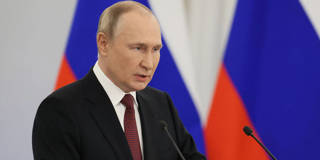The more apparent it is that Russia is losing, the more forcefully President Vladimir Putin declares that it is not. His speech declaring four more Ukrainian regions part of Russia – even as more territory there slips from Russia’s control – is a case in point.
MOSCOW – Not since the Soviet Union collapsed have I listened to a speech as Orwellian as the one Russian President Vladimir Putin delivered to declare that four Ukrainian regions are now Russia. Just as communism was once supposed to save humanity from imperialist exploitation, Russia is now apparently responsible for defending countries’ right not to be subjected to a “new colonialism” that would turn them into Western vassals. In Putin’s Russia, war is peace, slavery is freedom, ignorance is strength, and illegally annexing a sovereign country’s territory is fighting colonialism.

MOSCOW – Not since the Soviet Union collapsed have I listened to a speech as Orwellian as the one Russian President Vladimir Putin delivered to declare that four Ukrainian regions are now Russia. Just as communism was once supposed to save humanity from imperialist exploitation, Russia is now apparently responsible for defending countries’ right not to be subjected to a “new colonialism” that would turn them into Western vassals. In Putin’s Russia, war is peace, slavery is freedom, ignorance is strength, and illegally annexing a sovereign country’s territory is fighting colonialism.